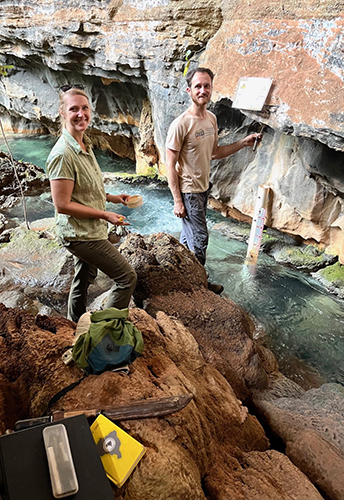WKU News
WKU Geology Team in Brazil to Help Understand Cave and Water Resources for a new Proposed National Park
- Tuesday, November 19th, 2024

A WKU group has just returned from Brazil after teaming up with scientists and students from Brazil’s Institute of Karst and the Federal University of Minas Gerais (UFMG) to study caves and water resources in a remote area of northern Brazil.
A team from the Crawford Hydrology Lab (CHL) within WKU’s Applied Research and Technology Program (ARTP) has been working with Brazilian colleagues for several years to better understand hydrology and water resources of the spectacular São Desidério karst area in Brazil’s Bahia State. The area, notable for a collection of enormous sinkholes and caves, is still being explored and efforts are underway to protect the area as a new Brazilian national park. The team’s collaborative work aims to better delineate and understand the area’s surface and groundwater systems to inform resource protection strategies.
WKU/Brazil ties through studies of groundwater hydrology go back to the 1990s, and over the past few years, grant funding from Brazilian agencies has supported collaborative dye tracing and hydrologic monitoring work. In October 2024, geologist Dr. Lucas Padoan de Sá Godinho visited WKU, presenting several lectures and collaborating in fieldwork in the Bowling Green area. Dr. Padoan is a post-doctoral research scholar in the laboratory of Prof. Dr. Paulo Galvão, Director of the Hydrogeology Studies Laboratory at UFMG.
While in Brazil, before heading into the field, members of the collaboration from both sides gave presentations at an International Symposium on Karst Hydrology that was organized at UFMG in the city of Belo Horizonte.
The WKU team in Brazil consisted of Chris, Deana, and Leah Groves (a student at both WKU and Bowling Green High School) along with CHL Associate Director Lee Anne Bledsoe and Laboratory Manager Autumn Singer. They were joined by Dr. Padoan, Brazil’s leading cave scientist Dr. Augusto Auler of the Karst Institute, and UFMG graduate student Gabriel Lourenço.
“Many of the landscapes on both the surface and underground at São Desidério are absolutely breathtaking,” said CHL Director Chris Groves. At the same time, “having to wear snake-proof pants on our hikes to caves and springs brought an unusual, yet oddly comforting, element to the work.”
Opportunities for continuing collaborations moving forward are very exciting, and much of the discussion during the trip involved new ways of thinking about data collection and interpretation, and indeed a deeper understanding of our work for all of us. Planning is already underway for a group of WKU students and scientists from WKU’s ARTP to visit Brazil next summer to attend an international conference and continue collaborations with our colleagues. This trip will clearly support ARTP’s vision for student intellectual growth through participation in supervised, hands-on applied research while preparing students for the knowledge-based 21st Century global economy.
Dr. David N. Brown, Dean of WKU’s Ogden College of Science and Engineering, remarked, “This work is a great example of international scientific collaboration benefitting communities through the sharing of expertise and experiences. Our faculty and staff lead important research efforts in which our students receive robust hands-on training.”

